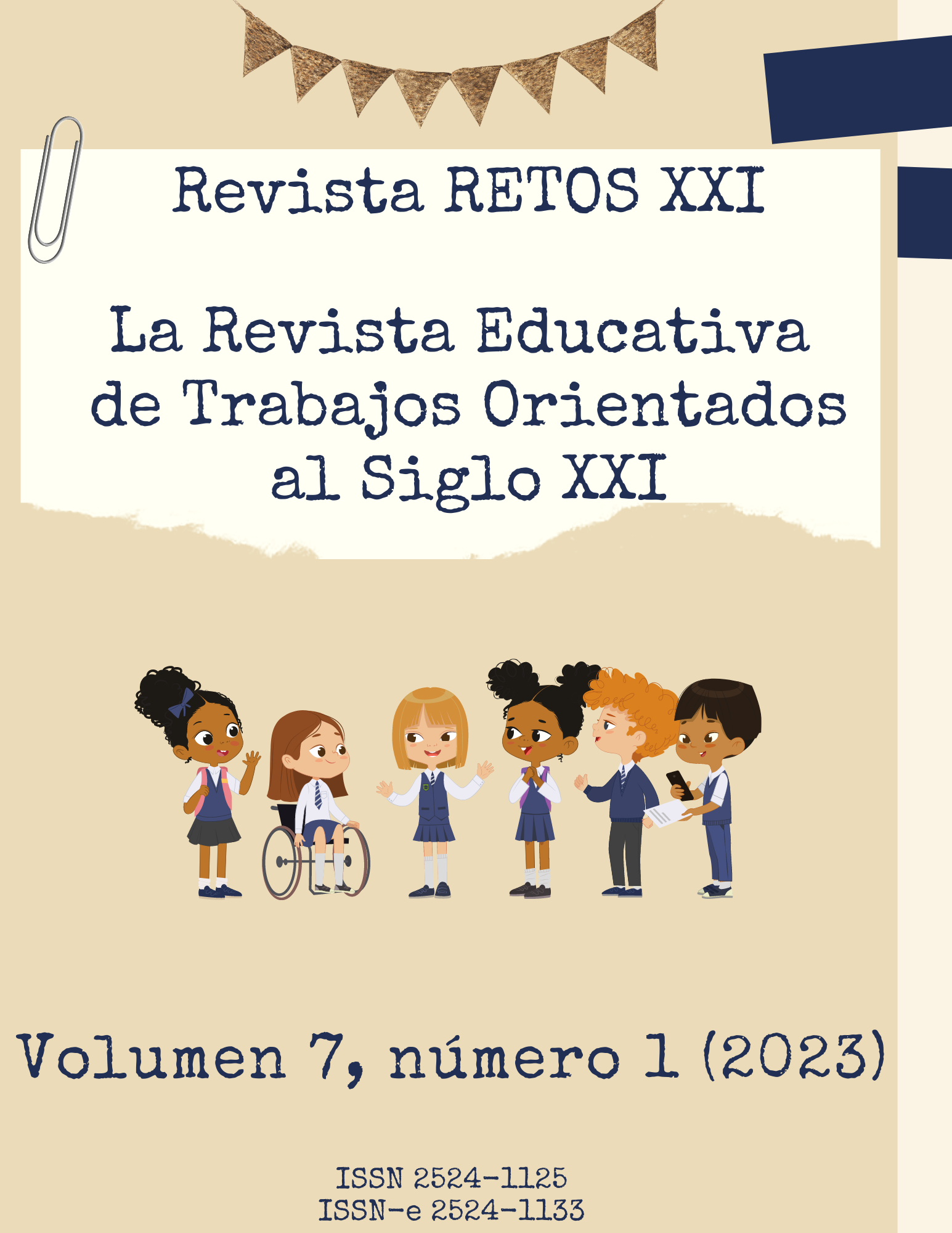The social inclusion of schoolchildren with Down syndrome
DOI:
https://doi.org/10.30827/retosxxi.7.2023.25286Keywords:
social inclusion, Down syndrome, speech therapistAbstract
The need to favor the social inclusion of schoolchildren with Down syndrome became the starting point of this research, which aims to: propose an action plan that contributes to the social inclusion of a schoolchild with this chromosomopathy, which receives the educational influence from a primary school of general education. The use of methods from the theoretical level: analytical-synthetic, inductive-deductive, historical-logical, transition from the abstract to the concrete, systemic-structural, from the empirical level: document analysis, participant observation, interview and case study, allowed to determine the existence of difficulties in the social inclusion of the student, influenced by little progress in the development of the pragmatic component, and by imitations in the development of habits and skills. Starting from the diagnosis made, an action plan is proposed, which is designed considering the determined regularities. It is made up of 3 areas (community, school and personal), in close interrelation. Different community agents are involved in it under the leadership of the language therapist and the possibilities offered by the school open to diversity are taken advantage of.
Downloads
References
Booth, T. & Ainscow, M. (2015). Guía para la Educación Inclusiva. Desarrollando el aprendizaje y la participación en los centros escolares. Adaptación de la 3ª edición revisada del Index for Inclusion. España: OEI.
Calvo, M.I. (2009). Participación de la comunidad. En P. Sarto y M.E. Venegas. (Ed), Aspectos clave de la educación inclusiva (pp. 41-58). Salamanca: Instituto Universitario de Integración en la Comunidad.
Esteban-Guitart, M., Oller, J. & Vila, I. (2012). Vinculando escuela, familia y comunidad a través de los fondos de conocimiento e identidad. Un estudio de caso con una familia de origen marroquí. Revista de Investigación en Educación, 10(2), 21-34.
Gallego, J. L. & Rodríguez, A. (2016). La alteridad en educación. Madrid: Pirámide.
González, R. (2019). "La inclusión educativa: retos y perspectiva desde la Agenda 2030". La Habana: Sello editorial Educación Cubana.
Hernández, T. B. (2020). Atención temprana al lenguaje de los niños con síndrome de Down. Tesis en opción al grado de Doctor en Ciencias Pedagógicas. Universidad Central “Marta Abreu” de las Villas, Cuba
Hernández, A. M. & Ainscow, M. (2018) Equidad e inclusión: retos y progresos de la escuela del siglo XXI. Retos XXI, 2, 13-22.
Hernández, T.B, Hernández, T., Rodríguez, B. (2019a, enero-abril). Desarrollo integral de un niño con síndrome de Down desde el modelo pedagógico cubano. Revista Varela. 52 (19), 120-135.
Recuperado de http://www.revistavarela.uclv.edu.cu/articulos/rv5209.pdf
Hernández, T.B, Hernández, T., Rodríguez, B. (2019b). Gabinete logopédico: espacio de extensión universitaria para la atención a niños con síndrome de Down. EDUMECENTRO. 11 (3), 6-19. Recuperado de http://www.revedumecentro.sld.cu/index.php/edumec/article/view/1398
Hernández, T. B.; Hernández, T.; Rodríguez, B.; Hernández R. M.; Alberca, N. E. & Aguinaga, D. R. (2021). The early attention of language in children with Down syndrome in preschool childhood. Turkish Journal of Physiotherapy Rehabilitation, 32 (2). Recuperado de https://turkjphysiotherrehabil.org/pub/pdf/322/32-2-182.pdf.
López, R. (2000). Educación de alumnos con necesidades educativas especiales. Fundamentos y actualidad. Ciudad de La Habana: Pueblo y Educación.
McGuire, D. & Chicoine, B. (2011). Apoyo de la familia y comunidad II Parte. Revista Virtual, febrero (117). Recuperado de: https://www.down21.org/revista-virtual/985-revista-virtual-2011/revista-virtual-febrero-2011-numero-117/articulo-profesional-apoyo-de-la-familia-y-comunidad.html
Murguia, M. (2021) La inclusión educativa de los escolares con trastornos en la comunicación oral. Tesis en opción al grado científico de Doctor en Ciencias. Universidad Central “Marta Abreu” de las Villas, Cuba
Murguia M.; Hernández T.; Hernández T. B. & Carrera M. (2020). Rol del maestro en la inclusión educativa de los alumnos con trastornos de la comunicación oral. Revista Propósitos y representaciones, 8 Number Special (3), 2310-4635. Recuperado de: http://revistas.usil.edu.pe/index.php/pyr/article/view/730.
Murillo, F.J. & Krichesky, G. J. (2015). Mejora de la escuela: Medio siglo de lecciones aprendidas. REICE, 13(1), 69-102.
Opertti, R. (2013). La educación inclusiva, perspectiva internacional y retos de futuro. Lima: Guzlop editoras.
Pérez, A.A. (2020). La inclusión social de los escolares con síndrome de Down (Tesis de grado). Universidad Central “Marta Abreu” de las Villas, Cuba.
Stainback, S. & Stainback, W. (2001). Aulas inclusivas. Un nuevo modo de enfocar y vivir el currículo. Madrid: Narcea.
Published
Versions
- 2023-09-22 (2)
- 2023-09-22 (1)
How to Cite
Issue
Section
License
Copyright (c) 2023 The Educational Journal of Works Aimed at the XXI century (XXI CHALLENGES)

This work is licensed under a Creative Commons Attribution-NonCommercial-ShareAlike 4.0 International License.












